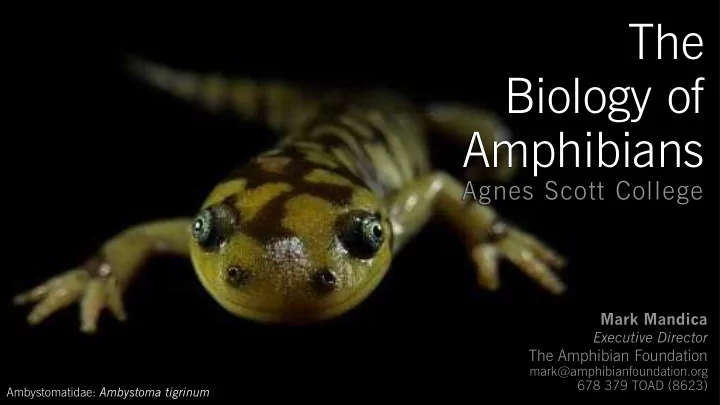

Salamandridae. Goldfuss, 1820 (120 sp.) The salamandrids are the family of true salamanders and newts. They are restricted to the northern hemisphere: North America, Europe, Asia and North Africa . Genera (22): Calotriton Gray, 1858 (2 sp.) | Cynops Tschudi, 1838 (10 sp.) Echinotriton Nussbaum and Brodie, 1982 (3 sp.) | Euproctus Gené, 1838 (2 sp.) Ichthyosaura Sonnini de Manoncourt and Latreille, 1801 (1 sp.) | Laotriton Dubois, 2009 (1 sp.) Liangshantriton Fei, Ye, and Jiang, 2012 (1 sp.) | Lissotriton Bell, 1839 (11 sp.) Neurergus Cope, 1862 (4 sp.) | Notophthalmus Rafinesque, 1820 (3 sp.) Ommatotriton Gray, 1850 (3 sp.) | Pachytriton Boulenger, 1878 (9 sp.) Paramesotriton Chang, 1935 (14 sp.) | Pleurodeles Michahelles, 1830 (3 sp.) Taricha Gray, 1850 (4 sp.) | Triturus Rafinesque, 1815 (9 sp.) Tylototriton Anderson, 1871 (22 sp.) | Chioglossa Bocage, 1864 (1 sp.) Lyciasalamandra Veith and Steinfartz, 2004 (7 sp.) | Mertensiella Wolterstorff, 1925 (1 sp.) Salamandra Garsault, 1764 (7 sp.) | Salamandrina Fitzinger, 1826 (2 sp.) Synapomorphies Salamandrids are distinguished from other salamanders by the lack of costal grooves along the sides of their bodies and by their rough skin. Some salamandrids posses aggregated poison glands behind their heads called parotoid glands, but many of them are toxic, posses aposematic coloration or defensive postures.
Salamandridae. Goldfuss, 1820 (120 sp.)
V E N O M O U S V S P O I S O N O U S M A N Y S P E C I E S O F A M P H I B I A N S A R E P O I S O N O U S . I N S A L A M A N D E R S , T H I S I S E S P E C I A L LY T R U E W I T H T H E N E W T S , O R S A L A M A N D R I D S . T E C H N I C A L LY, S N A K E S A R E N O T P O I S O N O U S T H E Y A R E V E N O M O U S T H E Y I N J E C T T H E I R T O X I N I N T O T H E P R E Y A G O O D WAY T O R E M E M B E R T H E D I F F E R E N C E I S : I F Y O U B I T E I T A N D Y O U D I E , T H E N T H AT I S P O I S O N I F I T B I T E S Y O U A N D Y O U D I E , T H AT ’ S V E N O M
Order : Caudata | Family : Salamandridae Salamandrina perspicillata
Order : Caudata | Family : Salamandridae Calotriton arnoldi
Order : Caudata | Family : Salamandridae Cynops orientalis
Order : Caudata | Family : Salamandridae Cynops orientalis
Order : Caudata | Family : Salamandridae Cynops cyanurus chuxiongensis
Order : Caudata | Family : Salamandridae Echinotriton andersoni
Order : Caudata | Family : Salamandridae Echinotriton andersoni
Order : Caudata | Family : Salamandridae Laotriton laoensis
Order : Caudata | Family : Salamandridae Euproctus platycephalus
Order : Caudata | Family : Salamandridae Neurergus strauchii
Order : Caudata | Family : Salamandridae Neurergus strauchii
Order : Caudata | Family : Salamandridae Neurergus kaiseri
Order : Caudata | Family : Salamandridae Ichthyosaura alpestris
Order : Caudata | Family : Salamandridae Lissotriton vulgaris
Order : Caudata | Family : Salamandridae Ommatotriton vittatus
Order : Caudata | Family : Salamandridae Pachytriton sp.
Order : Caudata | Family : Salamandridae Pachytriton labiatus
Order : Caudata | Family : Salamandridae Paramesotriton hongkongensis
Order : Caudata | Family : Salamandridae Lyciasalamandra helverseni
Order : Caudata | Family : Salamandridae Lyciasalamandra atifi
Order : Caudata | Family : Salamandridae Triturus marmoratus
Order : Caudata | Family : Salamandridae Triturus marmoratus
Order : Caudata | Family : Salamandridae Triturus cristitatus
Order : Caudata | Family : Salamandridae Pleurodeles waltl
Order : Caudata | Family : Salamandridae Pleurodeles waltl
Order : Caudata | Family : Salamandridae Journal of Zoology Journal of Zoology. Print ISSN 0952-8369 Hurt yourself to hurt your enemy: new insights on the function of the bizarre antipredator mechanism in the salamandrid Pleurodeles waltl E. Heiss 1 , N. Natchev 1 , D. Salaberger 2 , M. Gumpenberger 3 , A. Rabanser 4 & J. Weisgram 1 1 Department of Theoretical Biology, University of Vienna, Vienna, Austria 2 Upper Austria University of Applied Sciences, Campus Wels, Wels, Austria 3 Clinic of Radiology, University of Veterinary Medicine Vienna, Vienna, Austria 4 Department of Statistics and Decision Support Systems, University of Vienna, Vienna, Austria Abstract Keywords antipredator behaviour; urodeles; salamander; The Spanish ribbed newt Pleurodeles waltl shows a bizzare defensive mechanism rib. against predators. X-ray analysis before and after a simulated threat shows that this newt rotates its ribs anteriorly. The maximum measured angle to which the Correspondence ribs moved was 65 1 . This forward movement causes the sharply pointed rib tips to Egon Heiss, Department of Theoretical lacerate the body wall and project freely from the sides of the trunk as spines. Light Biology, University of Vienna, microscopy shows the microanatomy, and computed tomography shows the 3D Althanstr. 14, A-1090 Vienna, morphology of these unusual weapons. They are ‘spear-shaped’ and hollow Austria. proximally, massive distally and are connected to the corresponding vertebra by a Email: egon.heiss@univie.ac.at
Order : Caudata | Family : Salamandridae
Order : Caudata | Family : Salamandridae
Order : Caudata | Family : Salamandridae Tylototriton shanjing
Recommend
More recommend